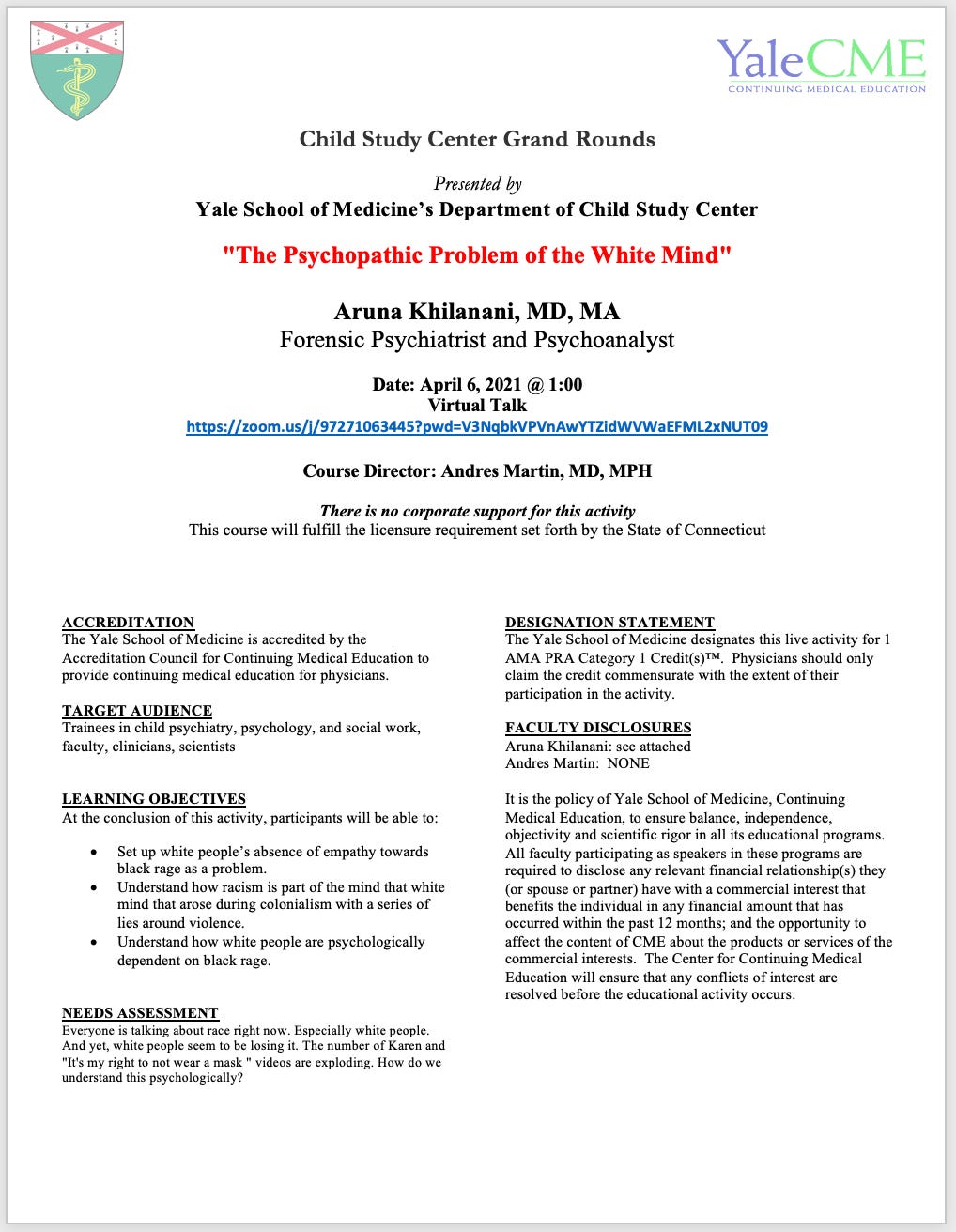A few weeks ago, someone sent me a recording of a talk called “The Psychopathic Problem of the White Mind.” It was delivered at the Yale School of Medicine’s Child Study Center by a New York-based psychiatrist as part of Grand Rounds, an ongoing program in which clinicians and others in the field lecture students and faculty.
When I listened to the talk I considered the fact that it might be some sort of elaborate prank. But looking at the doctor’s social media, it seems completely genuine.
Here are some of the quotes from the lecture:
This is the cost of talking to white people at all. The cost of your own life, as they suck you dry. There are no good apples out there. White people make my blood boil. (Time stamp: 6:45)
I had fantasies of unloading a revolver into the head of any white person that got in my way, burying their body, and wiping my bloody hands as I walked away relatively guiltless with a bounce in my step. Like I did the world a fucking favor. (Time stamp: 7:17)
White people are out of their minds and they have been for a long time. (Time stamp: 17:06)
We are now in a psychological predicament, because white people feel that we are bullying them when we bring up race. They feel that we should be thanking them for all that they have done for us. They are confused, and so are we. We keep forgetting that directly talking about race is a waste of our breath. We are asking a demented, violent predator who thinks that they are a saint or a superhero, to accept responsibility. It ain’t gonna happen. They have five holes in their brain. It’s like banging your head against a brick wall. It’s just like sort of not a good idea. (Time stamp 17:13)
We need to remember that directly talking about race to white people is useless, because they are at the wrong level of conversation. Addressing racism assumes that white people can see and process what we are talking about. They can’t. That’s why they sound demented. They don’t even know they have a mask on. White people think it’s their actual face. We need to get to know the mask. (Time stamp 17:54)
Here’s the poster from the event. Among the “learning objectives” listed is: “understand how white people are psychologically dependent on black rage.”
We’ve uploaded the lecture so you can listen to the whole thing yourself. Apologies for the less-than-stellar audio quality.
The talk, which was delivered via video in early April, was open to the public. But after it was delivered, Yale made the tape available only to those with a school ID. It was posted along with a trigger warning for “profanity and imagery for violence.”
Katie Herzog, who wrote yesterday about the spread of wokeness in medicine, interviewed the psychiatrist who delivered the talk, Dr. Aruna Khilanani.
Before you read on . . .
We are working hard to tell the stories others are ignoring.
If you value what you read in this newsletter, please become a paid subscriber:
KH: Your bio online says you are a “Forensic Psychiatrist and Psychoanalyst, with expertise in violence, racism, and marginalized identities. I left academic institutions because of institutional racism. Word.” Tell me about that. What happened?
AK: I trained at Cornell and Columbia and NYU and I really experienced all aspects of Cornell and Columbia as very racist. Less so NYU. NYU I found to be a lot more open. Cornell, I think we had one black faculty member. When I was at Columbia we had, I think, one black psychoanalyst. And just the way of thinking was all the same.
Do you have examples of what you experienced?
Sure. When I was at Cornell, I got beat up by a patient’s family member. I have a friend who is blonde and when she got threatened [by a patient] I think they did a Grand Rounds or a talk or some kind of symposium. They really addressed it. She was given a lot of support. And I’m not even sure if she was actually hit or not.
Now, when that happened to me, and I actually got beat up, the way they responded was, “Well what do you think you did to elicit this?” That's the question I got. Like I must have done something to provoke the attack.
Did you file a complaint?
No, because the more that you push back, the more they are going to keep attacking you. Also, in my first year, along with another person of color, I had the most Saturday call. These things are not incidental. There was a meeting where they actually tried to take away my vacation from me.
Why?
They came up with this idea that since I hadn’t put the request on the calendar then they’re not going to give it to me. So that one I did push back on. That one I reported. It was a very chilling conversation that I had with somebody. This is how these chilling conversations go. It’s never through email. They’ll call you on the phone and say, “We need to talk to you about something,” because they never want any of this stuff documented. They’ll be like, “Since you didn’t put this on the calendar, you’re not allowed to have vacation.” And I said, “So-and-so and so-and-so didn't put it on the calendar. Why do they get vacation?” And they’re like, “Do you really want to put yourself in the position where you're pointing out your colleagues’ stuff?” Like they needed to make me the person who is calling out my colleagues — not that it was unfair.
When was this?
When I was in residency. Either 2007 or ‘08.
Clearly the national conversation has changed a lot. I think in 2007, 2008, there were probably very few people who knew what anti-racism was. There was a lot more ignorance on the part of white people. Do you think things have changed in any meaningful way?
In some places things are starting to change, in other places, they really can’t reflect on themselves because there’s a lot to lose. I have a question for you.
Sure.
Is what you're writing going to be from a conservative perspective?
Well, I’m not conservative so, no.
I ask because I actually think that conservatives are psychologically healthier.
Interesting.
They are more in touch with their anger and negative feelings. They can articulate it. They can say it, they’re not covering it up or like “Oh my god, I’m amazing, I love all people.” There's not all this liberal fluff of goodness. Conservatives can go there. They can say things that are uncomfortable that I think liberals would shirk at or move away from or deny.
I would feel more comfortable hanging out with Ann Coulter than a lot of liberals because she’s unlikely to do anything. She’s in contact with her anger and her hatred, and I think that needs to be worked through, don't get me wrong, for the country to heal, but she's actually in contact with those feelings that a lot of people can't say out loud and that's a safer space. Now do I agree with her? No. But liberals have no access to that at all. The thought is forbidden.
It sounds like what you're saying is that you think liberals would be healthier if they expressed racism.
Absolutely. Well, not racism, because racism is an action. Racism occurs in a couple situations: when you are unaware of aspects of your unconscious, then it will come out in the form of an action. So if you are not aware of your own hatred and rage, it’s going to come out in an action if the feeling is not metabolized. For people who can say that they hate something and work through that feeling, then there’s more hope there. That’s where the work really needs to happen. I can’t really help the liberal who says, “There’s no problem here.” I can't do that much with that person. This country doesn't really give white people the tools to deal with their negative feelings.
I know you have a background in critical theory. How did you go from academia to psychiatry?
My masters is in humanities and the focus is largely on critical theory. I don't know if you’re familiar with the University of Chicago, but it was very critical theory-heavy when I went. I did pre-med stuff in undergrad and had always been thinking of these issues. I also majored in English Lit and wondered about other ways of thinking. And I was interested in the unconscious for a long time, so it wasn't that big of a jump for me.
From my experience, therapists tend to act pretty neutral. Is your practice like that?
Not at all. I think that's a part of the racist aspect of psychoanalysis, this idea that people are neutral is, I think, a complete fiction. But I would say that who I am inside the room is exactly who I am outside the room. My patients have a pretty good sense of who I am. I’m not the stereotype of the psychoanalyst where I’m withholding or won’t say anything or will just be there as a sounding board because that sounds really fucking cold and empty. That sounds awful. I do have people sit with their emotions and get into unconscious stuff but I’m there as myself to be with them.
Talk to me about the unconscious. What is this?
Critical theory is about how you are positioned in the world. Ever since I was a little kid, since I’ve interacted with people who are white, and especially white women, I would notice that things were really off. So what I’ve done by going through psychoanalytic training, which is all about getting in touch with the unconscious, is literally work backwards. I'm like, “Ok, I’ve noticed that white people tend to put me in certain roles. White women will experience me this way, white men will experience me this way.” I'm going to use psychoanalysis to work backwards and treat all of this as a projection to see what I can learn about their mind.
What do your sessions look like?
I don’t do CBT [Cognitive Behavioral Therapy], I don’t do DBT [Dialectical Behavioral Therapy], I don’t do med management, except like once every three months. I only do intensive psychotherapy or intensive psychoanalysis with or without meds. I largely work with the unconscious. What does it look like? It's different for everybody, but the way people organize their anxiety is usually very meaningful. And the narrative they tell me about it is how they are uniquely suffering. I feel like it's my job to help them with that.
Do you think that it’s your mission or your job or your duty to get to the root of a white person's racism or deal with their whiteness?
No. That makes it seem like it’s for me. If I were to do that it would be selfish as fuck. Do I focus on ways I think race is seeped into everything, yes, but it’s not for me. I can actually see how white people are suffering in a way that is very unique and different from people of color.
What is the difference between white peoples' suffering and the suffering of people of color?
People of color, myself included, suffer from being positioned in the world, psychologically, and the stuff that goes with it: violence, this, that. Now, white people suffer from problems of their own mind. They suffer with trust, they suffer with intimacy, they suffer with closeness, shame, guilt, anxiety. They suffer with their minds. Don’t get me wrong, people of color are also neurotic and have their own stuff and ups and downs. But there is a fundamental issue I think that is very unique to white suffering and I think that’s their own mind.
What would you say is the cause of this?
I think it’s colonialism. That history. If you do this much lying to yourself it's going to have an effect on your mind. There's no way it can’t.
How does that work? Are you talking about some kind of epigenetics or the passing down of the collective unconscious? I’m an American, a white woman, I don't have any direct experience with colonialism although I’m sure I've benefited from it in some ways, but it’s hard to see how I would be traumatized by this thing that happened before I was born.
I don’t think you do feel traumatized. White people experience this as normal. That’s their level of functioning that feels normal but it’s picked up in everything. It’s picked up in history, it's picked up in all aspects of culture.
Could you give me an example?
Of what?
Of how this is picked up in all aspects of culture. How do you see the after-effects of colonialism manifesting itself in the white mind today?
It’s going to be hard for me to give you a one sentence soundbite on this but I would say, a high level of guilt. I’ve never seen anything like this before. Other than in white people not eating bread, an incredible level of shame. Feeling really exposed all the time. A lot of perfectionistic tendencies. Not letting themselves move forward. Experiencing themselves as passive a lot.
So you think this is the effect of history?
I don’t think it’s an effect of history, I think it’s the effect of telling the lie. If you commit these acts, I don’t think someone is going to bitch slap you in the future. What got passed along were these lies about what actually happened. And those lies are internalized and become part of the culture.
What lie specifically are you talking about?
One lie would be that any time white people say they discovered something. Any time they steal something they use the word “discovery.”
You mean like food? Culture?
This country. That’s part of the rhetoric — “We discovered a country.” You haven’t discovered shit! But this idea is everywhere. Look at food bloggers who are like, “I invented something new,” and you're like, “Oh so you added flaky salt. You added a twig of parsley.” Everything else is stolen.
It does seem like you generalize a lot about white people but also people of color. Why do you do that?
What do you feel is a generalization?
Like white people having a high level of guilt or not eating bread. That’s true for some people, for sure. But I eat bread.
You asked me before, what is the unconscious? I think the unconscious is coming out right now between you and I. This idea that I’m the one that's generalizing is, I think, a defensive reaction to my talking about whiteness. You feel put on the spot and so I'm the one that's generalizing.
So you don’t think that you are generalizing?
This idea that I’m the one generalizing is actually defensive. Do I really believe on some level that every single white person is racist? No. Clearly. I have one percent left of that friend group. [In the lecture, Dr. Khilanani explains she has cut most of her white friends out of her life.] So no, I don’t. At the same time, I'm saying how it functions psychologically when someone says “You can’t say that,” and “Not all of us,” what you’re saying subconsciously is “I’m the exception to what you just said and you made me feel like I'm a racist and I don't experience myself that way. I do not want to experience myself as a racist and I'm going to turn the tables on you and say you're the racist because you're generalizing and that’s what a racist does."
Let's talk about your practice. You've mentioned that you treat a lot of white people and you treat “whiteness.” What is the distinction between the two?
I wouldn’t say there is a distinction. For example, for white women, I do help a lot with passive-aggressiveness — not being able to use their voice, say things, feeling like there will be a negative consequence. White people have an intense level of guilt. I have never seen a level of guilt that I see among white people. I mean, white people don't eat bread. Think about that. There have been wars all over the world over grains and bread and only here, white people are depriving themselves. Think about that shit. Everyone has this gluten allergy and you're like, what the fuck is a gluten allergy? That's a psychosomatic symptom. If you actually talk to a GI doctor, they're going to say, “Well, there’s Celiac and there's everything else” with a wink, and you know what the “everything else” is. It’s all the guilty gluten people.
Sure. There are lots of white people who don't eat bread, although I am not one of them. I exclusively eat bread, and I’m also skeptical of some claims of gluten intolerance but my assumption has always been that they’re just buying into pseudoscientific B.S. and following health trends. You think it’s white guilt?
On an emotional level, absolutely. Like, if I raise an eyebrow at a white person around bread, the first response is like, “It’s real.” What does that mean? They mean it’s not psychological.
Right. It’s a medical issue, not a mental one.
I don’t deny that people may get symptoms, but how is it that all these people suddenly now, after all the violence has occurred, are not eating bread. It’s like the weirdest fucking thing.
But what does bread have to do with violence? What’s the connection there?
I think the bread is about guilt and needing to keep them in a state of deprivation and stay guilty.
Do you think white people should feel guilty?
No, I think guilt is the most useless emotion on the planet. What function does it serve? It's not helpful.
Let's talk about your talk, “The Psychopathic Problem of the White Mind.” How did you get invited to do Grand Rounds at Yale in the first place?
I was invited to do it. A big part of my practice is also doing consultations for marginalized people and how they've been harmed in treatments, usually psychiatric or psychological treatments.
Ok so the talk was in April, and it was public?
Yes.
So walk me through what happened. You get invited, you give them the title of the talk, and then what?
Nothing. There was not a response for a long period of time. I was kind of surprised because usually people want to know a lot of details. And then I think, and I’m not sure about this, maybe they only put the announcement out the day before.
So not a lot of notice.
I’m not sure. This is what I think because I only got the concerns as relayed to me from the dean right before. I didn’t hear any concerns prior to that.
Let me pull up the email you forwarded me from the dean real quick. The message is from someone in the department to the dean and it says: “Good morning, I was surprised to see the announcement for tomorrow’s grand rounds. I imagine replacing the words ‘white mind’ with ‘Asian mind’ or ‘gay mind’ as we work towards equity and inclusion and unity. I wonder what impact this presentation will have.” Let's just address that. “Imagine replacing the words ‘white mind’ with ‘Asian mind’ or ‘gay mind’ as we work towards equity and inclusion and unity.” What’s your response to this? Does this person have a point?
I think part of the anxiety is my using the word “white” and them having to reflect on that. And there was the use of the word “equity.” When I’m breaking this down psychologically, what they’re saying on some level is like, “We need things to be the same. If you can say ‘white,’ we can say ‘Asian.’” Psychologically, they’re actually making a false equivalence. What they’re doing psychologically is obliterating the difference between white and Asian, and if you obliterate the difference there’s no fucking problem here so shut up, you're the real racist. That’s how it functions psychologically.
Let’s go through a bit of your talk here. You write: “This is the cost of talking to white people at all. The cost of your own life, as they suck you dry. There are no good apples out there. White people make my blood boil. Around five years ago, I took some actions. I systematically white-ghosted most of my white friends. And got rid of the couple white BIPOCs that snuck in my crew too. I stopped watching the news. Once I started, I couldn’t stop. I have less than one percent left. It was also a public service. I had fantasies of unloading a revolver into the head of any white person that got in my way, burying their body, and wiping my bloody hands as I walked away relatively guiltless with a bounce in my step. Like I did the world a fucking favor.” I can imagine that for some people the response to hearing a respected professional like yourself say that white people suck you dry and there are no good apples is going to be shame.
I think what a lot of people felt wasn’t shame but horror that I was in touch with aggressive feelings.
Sure. That makes sense. Do you find that this sort of rhetoric is effective or do people reject what you're saying because it is violent?
Before I gave the talk, I said, I want you to observe your thoughts and feelings as I talk. I said, there's a difference between a thought, a fantasy, and an action. Now, my reflection on my own rage was actually that I was feeling impotent. So that's where I was going with that. And kind of normalizing feelings of hatred. This is stuff that exists and I need to dive deep within myself to reflect on how it is that I got here. So there is a reality here, like did I actually cut white people out of my life? Absolutely.
When you were going through this process of cutting white people out of your life, what specifically would lead you to that decision?
Having the same conversations with people on repeat. People getting defensive, needing to argue, being unable to take in what I’m saying. An ability to say they’re not racist. And on repeat. I think my favorite responses were, “Well, you’re really sensitive. You’re over-reacting.” Focusing on my feelings. White women will often tell me that I’m really edgy and I’m like, “That’s so interesting that you're focused on my edginess. Have you reflected on why they might be?” But they can’t go there.
This reminds me a bit of Robin D’Angelo's writings, where she talks about how often in her trainings, the response from white women in particular is being defensive and shutting down. She calls this “white fragility,” but I'm curious about the effect. Do you find this is effective?
It depends on who my audience is. Do I think that that is effective for someone who is not in a place where they think there’s a problem with them? No, I don’t. Do I think it's effective for people who are a little bit scared but also kind of curious? Yeah, I do. I know my audience and what my own limits are. I’m for the people who want to walk into the other room and see how we view you. That’s who my audience is. In a private practice setting, no, I don’t do that and that’s because it's a fucking asshole thing to do. I need to be where they are at. When I’m speaking publicly, I need to invite someone into my room. This is how I talk with other people of color, this is how I talk with my black friends, this is how I talk with my Asian friends. This is how we talk about you. When I have patients, it's the other way around. I need to be humble and be where they're at. I need to sit with them and understand what they are going through. I feel like I've deepened a lot of my empathy for how much white people suffer from my white patients.
Let’s go through some other sections of the talk.
Did you have any reaction to it?
I found parts of it difficult to hear, for sure. I also found it refreshingly honest. There was one part that I really liked. You say: “White people love talking about race right now. You cannot get them to shut the fuck up. It makes them feel good. And, they also imagine it makes us feel good to see their true enlightenment. Talking about racism is a form of self-congratulatory masturbation. White people exchange pleasantries, without really addressing racism. It serves no purpose in connecting other than to jerk themselves off.”
I’m surrounded by people who do that, especially on social media. I find it very performative and it seems disingenuous. It also just seemed to appear overnight after the death of George Floyd. It's like every one I know decided to be an anti-racist the next day. They might not have known what that meant but they bought “White Fragility” and Ibram Kendi and maybe read them or maybe just posted photos of them on social media. It felt very performative and self-congratulatory and trendy to me. But I am curious about what you see is the solution here, because you say that white people love talking about race but in another part, you say that talking with white people about race is a “waste of our breath.” You say, “We are asking a demented, violent predator who thinks they are a saint or a superhero, to accept responsibility. They have five holes in their brain. It’s not going to happen. It’s like banging your head against a brick wall. Not a good idea.” But you do talk to white people about race. You were doing it at Yale. Walk me through that.
I’m saying that talking about race right now like white people are doing, like occupying that much space for something they’ve never actually gone through but see themselves as self-appointed experts as, it serves a defensive function to not feel a negative feeling because if you're teaching about it and you're able to give and help, you don’t actually have to do the thing that is harder, which is feel negative feelings. So when I was saying that talking to white people is useless, I'm not actually really saying it's useless because if I really thought it was useless I wouldn't devote time to doing this. I'm talking about an experience that I have, that people of color have, of futility when coming up against a psychological defense. So it’s an experience of futility.
So do you think white people who talk about racism all the time, and I think we could probably picture the stereotype of how that might be, do you think that they're easier to reach because at least they acknowledge the existence of racism?
No, I think they’re harder to reach. Their defenses are up, right? You have to be very arrogant to imagine that you're suddenly a teacher of something you're never gone through. That is an incredible level of arrogance. Your psychological defenses are high, they’re intact, they’re rigid. So that is actually harder. People are feeling very upset right now that what they thought they were going to have — a job, a position — is suddenly now being threatened by people of color. Now actually talking about that and saying that out loud is healthier because they can say it. They're like. “I’m mad. I thought that I should be able to get this thing and now I feel like it's been taken away from me.” That’s a lot of people’s experience right now. Suddenly they feel like what should be rightfully theirs has been taken away. But actually what's happening is that the playing field is being leveled and they have to go through a loss as they lose their unearned advantage. That’s hard. But if someone doesn't have access to that feeling and can't get mad or feel pissed off because they don't think that exists, that’s harder. That's going to be harder for them emotionally. They’ll be like, “It’s fine, I’m fine.” How could you be fine? Your entire world operated one way and suddenly what you thought was certain and what you thought was going to be yours, you are no longer sure is going to be coming your way. That's scary.
When you talk about it like that it does seem like you think that white people are going to have to give something up for equity. Do you think that's true and if so what is that thing that white people are going to have to give up?
It’s not a thing. It’s a way of being. It's a level of certainty and control that just kind of came for them before.
Are you talking about jobs or money or . . . ?
Yeah, a lot of things. But I also think there's a loss they have to go through that is psychological, too, and this might be the harder thing. If you know one way of existing and that's been your way of existing and suddenly that feels like it’s changing on you, that’s terrifying.
A lot of people say that the election of Donald Trump was a reaction to this, but then Donld Trump had a higher share of black and Latino votes in 2020. How do you explain something like that?
It’s internalized whiteness. After a period of time, you're going to start internalizing these things because you're attacked.
You say in your talk, “I got rid of the couple white BIPOCs that snuck in my crew too.” What is a white BIPOC?
It's someone who has internalized a lot of these thoughts. It's the same thing.
The way that you talk about whiteness, it’s almost like it’s a state of being. Is that correct?
I would say it’s a state of mind that affects how you think consciously and how you think unconsciously.
Are all white people afflicted by whiteness?
It’s impossible to not be. You would have to do an incredible level of work to not be.
It sounded like your talk was very well received by the audience. But what happened afterwards?
There were a lot of delays before Yale posted it. They said they were going to put out the talk the following Monday and that they had received a ton of requests for this talk so they wanted to get it up quickly. And then it didn’t happen. People started emailing them requesting the talk and they got very different responses. First they were saying that there were some technical difficulties and then they told another person that this was a chronic issue and that there are many other talks that need to be released and they need to go in order. That was brand new. Like, if you’ve been working on this for six weeks, why not say that before? “It’s white amnesia, I just suddenly remembered that we are having this IT difficulty. Whoops!” Then I begin to hear from different people that there is this stuff going on at Yale about the talk, that there’s pressure building, that a lot of the people wanted to know what was going on, so people started to complain internally and demand that the video be put up. Then they released it internally only. Of course they didn’t call me during any of this.
When we were corresponding via email you said people were afraid. What are they afraid of?
I guess it would be retaliation. It's sort of like that question you asked me about racism when I was in residency, and it's like this stuff happens to me every minute of every day. They get very angry if you start to stick up for yourself. It really elicits a lot of rage and a lot of retaliation.
And this was people trying to get access to the video, they were afraid to ask for it?
I think people were afraid to put their names on things, that kinda thing.
It’s interesting that you say that because I’ve been interviewing clinicians for this series who are opposed to social justice ideology in medicine and who see the need for progress but who don't like what’s going on. And nobody will put their name on anything. A lot of people talk about how cancel culture is stifling discourse and people are afraid of consequences, so it’s interesting to me that we’re talking about two different groups of people and these people who aren’t woke are afraid and you’re saying that the people who are woke are afraid, too. What does that tell you about the moment that we’re living in right now?
That everyone is scared to change, I think. People of color are scared of retaliation and consequences for speaking and owning their own thoughts. It’s a responsibility issue, too. If you are opposed to social justice, why wouldn’t you say that?
Because they’re afraid. They all say the same thing, they think they’ll be penalized if it's known that they oppose antiracism. They’re afraid of retaliation.
They’re afraid of retaliation or afraid of being judged?
Probably both. There have been examples of people who’ve lost their jobs. You see people fired for a bad tweet or lost their attending privileges because of a tweet.
Everyone is terrified and it might be different what that terror is, but for the people who are opposed to it, I wonder if they’re doing any work with their thoughts and feelings or their own, what their fears and anxieties are.
If you appreciate the work we’re doing, please support us by subscribing:
















I had to quit reading about half way through so I could give my soul a bath. Evil evil stuff.
Hate with an MD and "board certified in Forensic Psychiatry." Remember Radovan Karadzic?